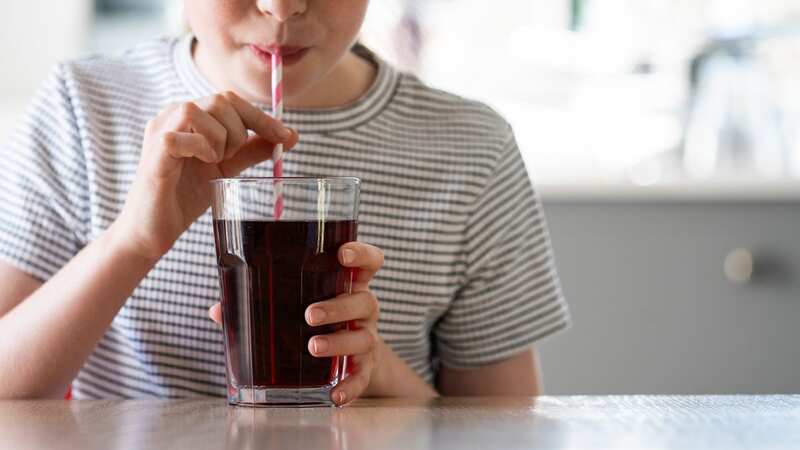Six 'toxic' sugary drinks that may be making children across the UK sick

Experts have revealed the worst possible drinks you can give to your kids with "shocking" amounts of sugar and twice as much caffeine as a can of Red Bull.
Slushies, milkshakes and energy drinks are all big no-nos when it comes to quenching your child's thirst, nutritionists claim. While okay as an occasional treat, some of these beverages contain ingredients linked to stomach aches, cell damage and sleep problems.
The warning comes after two youngsters recently became seriously ill after drinking slushies last month - one of whom fell unconscious. Victoria Anderson's three-year-old son Angus "collapsed and began fitting" after slurping on the crushed ice treat, usually served up at cinemas and bowling lanes.
The terrified mum rushed him to their local hospital in Inverclyde only to be told Angus has suffered from glycerol intoxication. Also known as E422, glycerol is regularly used in slushie drinks to prevent them from fully freezing, and can be dangerous when consumed by especially young children.
Angus' reaction followed another boy, Albie Pegg in Nuneaton, Warwickshire, who also became ill after drinking a strawberry frozen drink. With that in mind, experts have listed the worst drinks parents could give their kids, from artificial dairy treats to turbocharged caffeine explosions.
 Teachers, civil servants and train drivers walk out in biggest strike in decade
Teachers, civil servants and train drivers walk out in biggest strike in decade
Milkshakes
Often a staple with your burger and fries, these sweet thirst-quenchers come with a dark secret. Milkshakes contain exorbitant amounts of sugar, with a recent survey by charity Action On Sugar exposing just how much is hidden.
The general milkshake base from Five Guys contains a staggering 69g of sugar - about the same as five donuts. One large McDonald's vanilla milkshake contains 77g - more than double the UK recommended daily allowance of 30g.
While parents can often be misled by the assumption the calcium in milkshakes is good for children's bones, too much sugar has been linked to weight gain and type 2 diabetes.
Fruity fizzy drinks
It's hardly a secret that fizzy drinks are far from being a healthy way to hydrate. Nutritionists for years have warned of the effects of regularly consuming cans of Fanta and Lilt, from the high amounts of sugar to other concerns about artificial chemicals.
Sodium benzoate is regularly found in cans of pop. The preservative prevents moulds from growing in the drinks, but scientists at Sheffield University found it may also have the ability to switch off parts of DNA, which would cause damage to our cell structure.
This problem could in theory cause cirrhosis of the liver and degenerative conditions like Parkinson's. However, leading world health authorities have declared it completely safe.
Ribena
A household name and possibly the drink many of us associate with our childhoods. But the blackcurrant squash favourite also contains high levels of aspartame - a low calorie sweetener found in diet fizzy drinks and other low-calorie foods which has been marred in controversy in recent years.
While a study 30 years ago linked high doses of aspartame with various types of cancer, the World Health Organisation this year decategorised it as a possible carcinogenic, saying there was "limited evidence" to support the connection. Nutritionist Amanda Ursell told The Sun Ribena "should be consumed with caution as, along with many other sugar-free drinks, it contains aspartame",
Prime
The YouTuber-promoted energy drink which saw teenagers queue outside off-licences last year now seen on reduced shelves in supermarkets is hiding a dark secret behind its bright packaging. Bottles of Prime Energy, which was peddled by KSI and Logan Paul and saw some shops selling ot for as much as £100 to capitalise off the initial demand, has huge amounts of caffeine.
Hardly suprising as an energy drink, but with the beverage specifically appealing to youngsters, nutritionists warn parents should take extra caution when letting their child take a swig. One 330ml serving contains 140mg of caffeine - about four cans of Coca Cola's worth, or nearly the same as two cans of Red Bull.
 Greggs, Costa & Pret coffees have 'huge differences in caffeine', says report
Greggs, Costa & Pret coffees have 'huge differences in caffeine', says report
According to The Cleveand Clinic in the US, no amount of caffeine has been proved as "safe" for children below 12. While we tend to rely on it as adults, it has been linked to headaches and insomnia. The health risks of energy drinks to young people this month prompted Labour's pledge to ban under-16s from buying them.
Cola
Again, it's hardly news the world's favourite fizzy drink is also bad for us. Nutritionist Amanda said parents should "think twice" about giving in to children's pleas for a can of Coke after school or during the holidays.
As well as high amounts of sugar or artifical sweeteners, cola drinks are also laden with phosphoric acid. The preservative ups the drink's acidity to a pH of 2.5 - higher than that of lime juice.
Acidic drinks can strip the teeth of layers of enamel and leave them vulnerable to bacteria which causes cavities. Amanda said: "At a time when children should be developing strong teeth, it is vital to avoid acidic and sugary beverages that could end up ruining their smile."
Slushies
The bright colours are especially appealing to young children, but the Food Standards Agency (FSA) warns children under 10 should be refused service when asking for refills due to the risks involved with young people consuming too much glycerol.
Drinks companies in the UK have already been warned to use the minimum amount necessary, yet a 350ml serving of popular ice slushies can contain as much as 17,700mg - far more than the maximum recommended for four-year-olds.
Read more similar news:
Comments:
comments powered by Disqus































